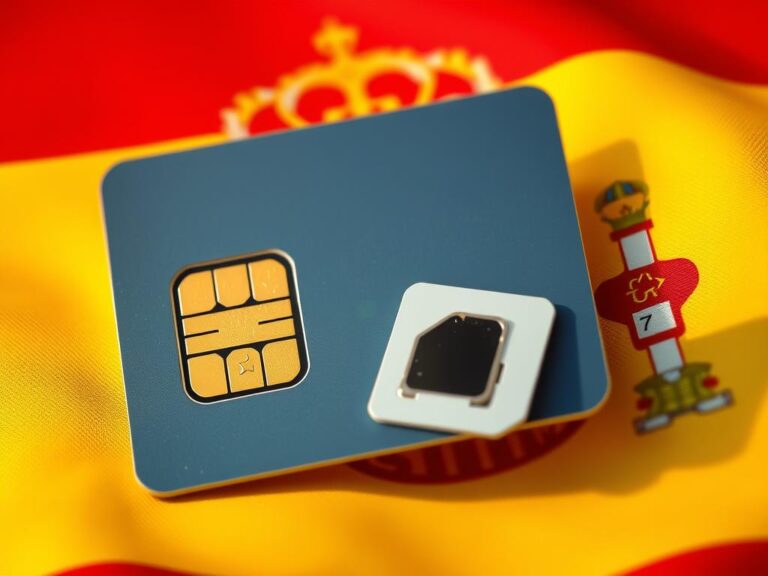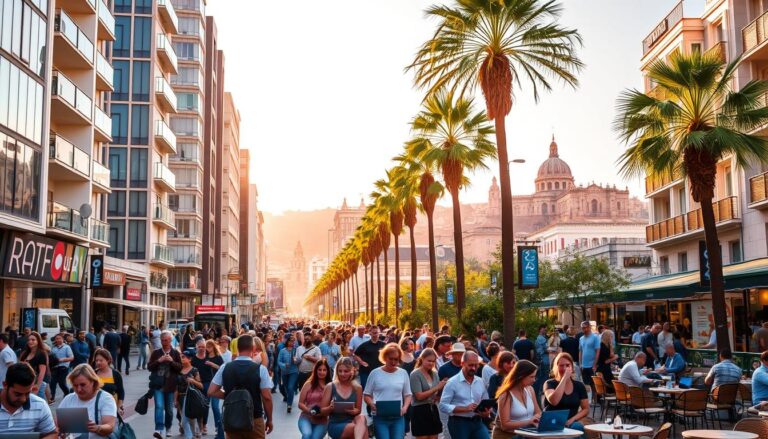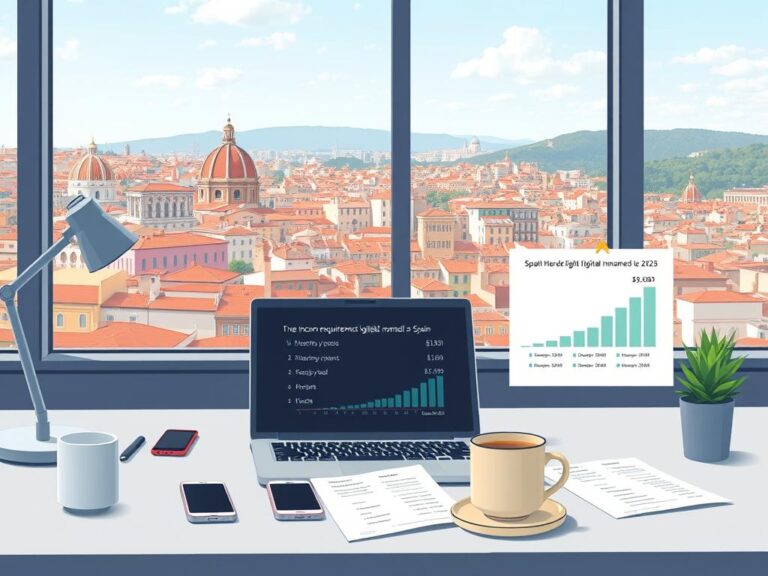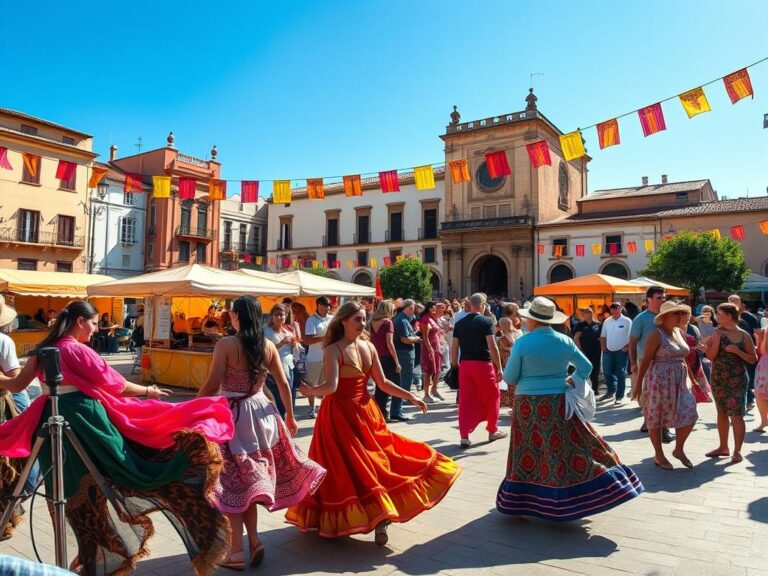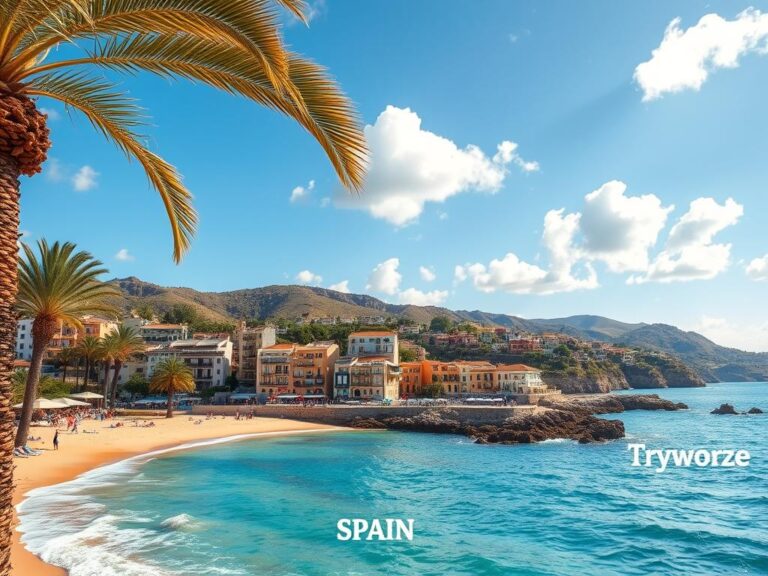Spain Digital Nomad Visa Guide (2025 Update)
Thinking of moving to a beautiful European country and keeping your remote job? You’re in good company. Now, thousands of non-EU citizens can live and work in Spain thanks to a new visa.
The Spain Digital Nomad Visa lets you stay in Spain for up to 12 months. You can even renew it for up to five years. It’s perfect for remote workers who want to enjoy Spain’s culture and lifestyle.
In this guide, we’ll cover what you need to know about the digital nomad visa spain2025. It doesn’t matter if you’re a freelancer or work for a company. We’ll show you how to get a remote work visa spain.
What is the Spain Digital Nomad Visa in 2025?
In 2025, Spain’s Digital Nomad Visa is a big push by the Spanish government. It aims to draw in foreign investment and start-ups. This visa lets remote workers live in Spain while working for companies abroad. It’s a great chance for digital nomads to enjoy Spanish culture while keeping their global careers.
Key Features and Recent Changes
The Spain Digital Nomad Visa has some key features that remote workers find appealing. These include:
- The chance to live and work in Spain for a year, with the option to renew.
- No need for a local job offer or business in Spain.
- Flexibility to work for any company outside of Spain.
- A path to long-term residency and, eventually, Spanish citizenship.
Recently, the visa programme has been made easier to apply for. The aim is to make Spain more welcoming to digital nomads.
How the Programme Has Evolved
Launched in January 2023, the Spain Digital Nomad Visa has grown a lot. At first, it faced issues like long wait times and strict rules. But, the Spanish government listened to feedback and made big changes.
These changes include making the application process smoother. They also clarified who can apply and improved support for applicants. Now, the programme is more welcoming to digital nomads from around the world.
Eligibility Requirements for Spain Digital Nomad Visa
If you’re thinking about getting the Spain Digital Nomad Visa, knowing what you need is key. This visa is for people from outside the EU/EEA who want to live and work in Spain. They must do this while keeping their remote job or running their own business.
Income and Employment Requirements
You need to show you make at least €2,760 a month. This proves you can look after yourself while in Spain. You also have to work remotely or own a business that lets you work from anywhere.
Key employment conditions include:
- Being employed by a company or being self-employed with clients outside of Spain.
- Having the ability to work remotely using digital tools.
- Maintaining a stable income that meets the minimum requirement.
Nationality and Background Check Requirements
If you’re not from the EU/EEA, you’ll have to get a background check. You’ll need a clean criminal record from your home country or any place you’ve lived for the last five years. The document must be recent and legal.
Health Insurance and Other Essential Requirements
You must have health insurance that covers you in Spain. Your policy should offer full medical care. You also need to show you have a place to live in Spain.
Other essential requirements include:
- Having a valid passport with sufficient validity.
- Filling out the appropriate visa application form.
- Paying the required application fee.
By fulfilling these requirements, you can get the Spain Digital Nomad Visa. This lets you live and work in Spain while keeping your remote job or business.
Step-by-Step Application Process
Getting a Spain Digital Nomad Visa is easy if you’re well-prepared. It’s important to know what steps to take.
Preparing Your Application
First, collect all the documents you need. This includes:
- Valid passport
- Proof of income
- Health insurance
- Criminal record certificate
- Proof of qualifications or experience
Make sure your documents are correct. Your passport must be valid for six months after your stay. Also, your health insurance should cover you during your stay.
Submitting Your Application
With your documents ready, apply at a Spanish consulate or embassy. It’s wise to:
- Book an appointment early to avoid delays
- Fill out the form correctly
- Pay the application fee
You might need to have an interview. Be ready to talk about your application and answer extra questions.
After Submission: What to Expect
After applying, wait for a decision. Decisions usually come within a few weeks. It’s key to:
- Keep track of your application status
- Reply quickly to any extra information requests
Stay updated on your application. This helps you stay calm and be ready for Spain.
By following these steps and being thorough, you can get your Spain Digital Nomad Visa and start your adventure in Spain.
Required Documentation Checklist
Applicants for the Spain Digital Nomad Visa need to have all necessary documents ready. It’s important to gather the right paperwork for the application process.
Personal Documents
First, you’ll need to provide personal documents. These include:
- A valid passport with at least six months’ validity
- A completed and signed application form
- Recent passport-sized photographs that meet the required specifications
- Proof of address, such as a utility bill or rental agreement
Professional and Financial Documents
You’ll also need to submit professional and financial documents. These are:
- Proof of income, such as bank statements or employment contracts, showing you have enough money to support yourself
- Health insurance that covers you in Spain and meets the minimum requirements set by the authorities
- A criminal record certificate from your home country or any countries where you’ve lived in the past five years
- Qualification documents, such as diplomas or professional certifications, relevant to your field of work
Make sure all financial documents are up-to-date and translated into Spanish or English, if needed.
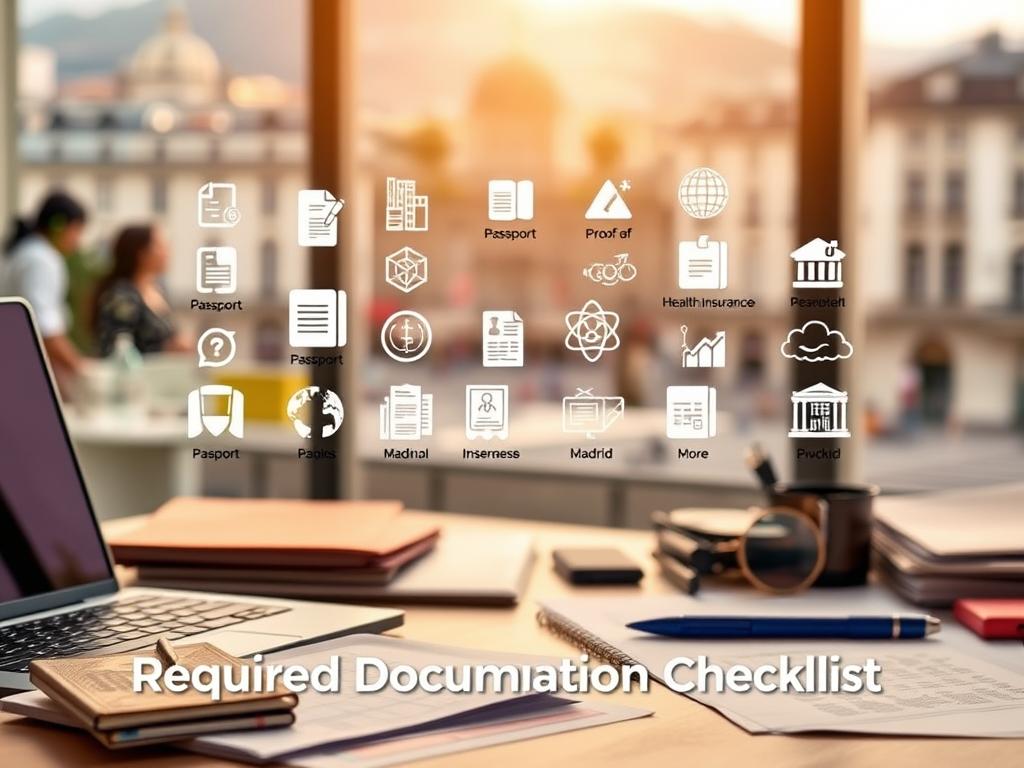
Additional Documentation for Family Members
If you’re applying with family members, you’ll need more documents. This includes:
- Marriage certificates or civil partnership documents for spouses or partners
- Birth certificates for children
- Proof of financial dependency for family members, showing they are financially supported by you
- Health insurance for family members, ensuring they are covered in Spain
Ensure all documents are accurate, complete, and meet the specific requirements outlined by the Spanish authorities. This will help avoid delays in your application.
Costs and Fees for the Digital Nomad Visa Spain 2025
Knowing the costs for the Spain Digital Nomad Visa is key for a smooth application. It’s important to know all the expenses involved.
Application and Processing Fees
The application fee for the Spain Digital Nomad Visa is a big cost. As of 2025, it’s around €80-€90. This fee is needed and must be paid when applying. There might also be extra fees for how you submit your application and how fast you need it processed.
Key points to consider:
- The application fee is non-refundable, even if your application is rejected.
- Payment methods may vary depending on the submission method (online or in-person).
- Keep receipts and payment confirmations for your records.
Additional Costs to Consider
There are other costs to think about too. These include:
- Document translation and apostille fees.
- Health insurance that meets the Spanish government’s requirements.
- Any additional documentation or certificates required for your application.
For instance, translating documents can cost between €20 to €100 per document. This depends on the document’s complexity and the service provider. Health insurance costs vary a lot, based on your age, health, and the coverage you need.
Cost Comparison with Previous Years
Looking at the costs of the Spain Digital Nomad Visa in 2025 compared to past years is helpful. The application fee has stayed pretty much the same. But, other costs like health insurance and document translation might have gone up.
Changes to note:
- The application fee has seen a slight increase from previous years, reflecting administrative cost adjustments.
- Health insurance costs have risen due to increased healthcare costs and regulatory changes.
By knowing these costs and how they compare to before, you can plan your application and budget better.
Timeline and Processing Periods
When planning to move to Spain, knowing the visa processing timeline is key. Understanding how long it takes can help you prepare and avoid delays.

Standard Processing Times
The standard time for processing the Spain Digital Nomad Visa is 15 to 45 days. But, this can change based on the consulate and how many applications they have. Always check with your local Spanish consulate for the latest on processing times.
Factors influencing processing times include:
- The completeness and accuracy of your application
- The workload of the consulate or embassy processing your application
- The time of year (with certain periods being busier than others)
Expedited Options and Best Application Periods
Standard times give a general idea, but you can speed up your application in some cases. Expedited processing might cost extra, but it’s not always available. Always ask about this when you apply.
To possibly get your application processed faster, apply when there are fewer applications. Try to avoid busy travel times or when lots of applications are being processed.
Tips for a smoother application process:
- Make sure your application is complete and correct to avoid delays
- Apply well before your planned move date
- Check with your local Spanish consulate for specific guidance on processing times and any extra requirements
Benefits of the Remote Work Visa Spain
Spain’s Remote Work Visa aims to attract talent worldwide. It offers benefits that boost your lifestyle and work flexibility. As a digital nomad, you’ll find it improves your work and personal life.
Tax Advantages for Digital Nomads
The Spain Digital Nomad Visa comes with tax perks. You might get tax benefits that cut down your costs. For example, if you’re not a tax resident, you could pay less tax. Always talk to a tax expert to see how these benefits apply to you.
Key tax considerations include:
- Potential exemption from wealth tax
- Favourable tax treatment for non-residents
- Possibility of benefiting from double taxation agreements
Travel Benefits Within the Schengen Area
With the Spain Digital Nomad Visa, you can travel the Schengen Area freely. This lets you visit many European countries without extra visas. You can seamlessly travel for work or fun, enriching your digital nomad journey.
Family Reunification Options
The visa also lets you bring your family to Spain. This is great for digital nomads wanting a better work-life balance. Living with your family in Spain can make your life more stable and fulfilling.
Family reunification typically includes:
- Spouse or partner
- Dependent children
- In some cases, other dependent relatives
Knowing these benefits can help you decide on the Spain Digital Nomad Visa. These perks can improve your digital nomad lifestyle and offer rich cultural and professional experiences in Spain.
Visa Renewal and Pathways to Residency
The Spain Digital Nomad Visa is a flexible way to live in Spain long-term. It could even lead to Spanish citizenship. Knowing how to renew your visa and get residency is key.
Renewal Process and Requirements
Renewing your visa is easy if you keep meeting the original criteria. You must show you have enough money, health insurance, and a clean record.
Key documents needed for renewal are:
- A valid passport
- Proof of income or employment
- Health insurance that covers you in Spain
- A certificate of residence in Spain
Apply for renewal at least 60 days before your visa ends. Starting early helps keep your residency continuous.

Transitioning to Long-term Residency
After five years on the Digital Nomad Visa, you can apply for long-term residency. This gives you more rights, like working freely in Spain.
To apply, show you’ve lived in Spain for 183 days a year for five years. You’ll need to provide proof of residence, financial stability, and integration into Spanish society.
Potential Pathway to Spanish Citizenship
After ten years of residency, you can apply for Spanish citizenship. You need to show a strong connection to Spain, pass a test, and speak Spanish well.
Citizenship brings many benefits, like voting, free public healthcare, and a Spanish passport for EU travel.
Always check with the authorities or a legal expert to make sure you meet all the requirements and follow the right steps.
Best Cities in Spain for Digital Nomads
Spain has many cities perfect for digital nomads. From Barcelona’s tech scene to Madrid’s culture, each city offers something special. They differ in quality of life, infrastructure, and community.
Barcelona: Tech Hub and Coastal Living
Barcelona is a top choice for digital nomads. It mixes technology, culture, and beach life. The city is full of tech startups and innovation hubs. It’s perfect for those in tech.
With its lively vibe, stunning beaches, and rich culture, Barcelona is ideal for remote workers. It offers a balanced lifestyle.
Key attractions: Beachside promenade, modernist architecture, thriving tech scene.
Madrid: Capital City Advantages
Madrid, Spain’s capital, offers a unique lifestyle. It’s known for its cultural scene, museums, and landmarks. The city also has a growing startup scene with coworking spaces and networking.
Madrid’s nightlife and food are also big draws. It’s great for those who love city life.
Key advantages: Cultural events, business opportunities, vibrant nightlife.
Valencia: Affordable Mediterranean Lifestyle
Valencia provides a Mediterranean lifestyle at a lower cost. It’s famous for its parks, architecture, and food. It’s perfect for digital nomads wanting a calm life by the sea.
Key benefits: Affordable living, beautiful parks, culinary delights.
Emerging Digital Nomad Hotspots for 2025
While Barcelona, Madrid, and Valencia are popular, new cities are becoming digital nomad favourites. Seville and Palma de Mallorca are gaining fans for their unique appeal and improving remote worker facilities.
- Seville: Known for its historical charm and warm climate.
- Palma de Mallorca: Offers a blend of island culture and modern amenities.
These cities offer different lifestyles and are worth exploring as you plan your move to Spain.
Practical Tips for Living in Spain as a Digital Nomad
Living in Spain as a digital nomad is exciting but needs planning. You’ll face several key challenges. These will help you enjoy your time in this beautiful country.
Finding Accommodation
Finding the right place to live is a big challenge. Spain has many options, from city centre apartments to rural homes. Use online platforms like idealista and fotocasa to find places.
Look for areas popular with expats and digital nomads. The Eixample in Barcelona and Malasaña in Madrid are great. They have a lively vibe and services for international people.
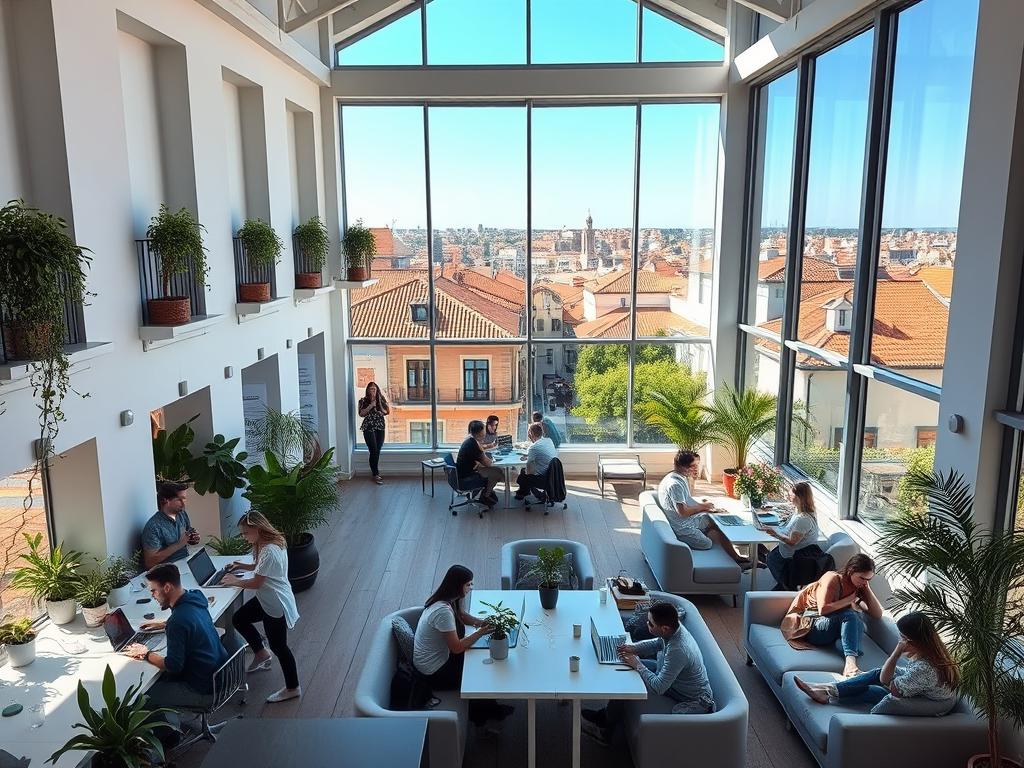
Banking and Finance
Managing your money well is key when living abroad. You can open a bank account with N26 or Revolut. They cater to digital nomads and expats.
Check the fees of different banks. Look at charges for ATM withdrawals, card payments, and keeping your account. Some banks have special accounts for foreigners with benefits like English-speaking service and online banking.
Coworking Spaces and Networking Opportunities
Spain has a growing digital nomad community. Many coworking spaces are available, from trendy city hubs to coastal towns.
Joining a coworking space is great for networking. You can attend events and workshops. Popular spots include Impact Hub, Le Cambri, and Outsite. They host events and offer a place to work and meet others.
Spain Digital Nomad Visa vs Other Visa Options
The Spain Digital Nomad Visa is one of several options for those looking to live and work in Spain. It’s important to know how it compares to others. Choosing the right visa can greatly affect your experience in the country.
Comparison with Non-Lucrative Visa
The Non-Lucrative Visa is for people who have enough money to live in Spain without working. The Digital Nomad Visa, on the other hand, lets you work remotely for companies outside Spain.
- Key differences:
- Income source: Non-Lucrative Visa needs passive income, while Digital Nomad Visa allows active income from foreign employers.
- Purpose: Non-Lucrative Visa is for those not working in Spain, whereas Digital Nomad Visa is for remote workers.
Comparison with Freelance Visa (Autónomo)
The Freelance Visa, or Autónomo, is for those who want to work as freelancers or start their own business in Spain. Both the Digital Nomad Visa and Freelance Visa let you earn income. But they serve different needs.
- Key differences:
- Work nature: Freelance Visa requires work in Spain, possibly with Spanish clients, whereas Digital Nomad Visa is for remote work for foreign companies.
- Registration: Freelance Visa means registering as Autónomo, which has extra administrative and tax duties.
Comparison with Other European Digital Nomad Visas
Many European countries have digital nomad visas, each with its own features. Comparing them can help you choose the best country for your lifestyle.
- Key features of Spain’s Digital Nomad Visa compared to others:
- Duration of stay: Spain offers a relatively long initial stay period.
- Path to residency: Spain provides a clear pathway to long-term residency and potentially citizenship.
- Cultural and lifestyle factors: Spain is known for its rich culture, pleasant climate, and welcoming environment.
Understanding these comparisons helps you choose the visa that best fits your needs and preferences.
Conclusion
You now know a lot about the Spain Digital Nomad Visa. It’s a great chance for non-EU citizens to live and work in Spain. The digital nomad visa Spain 2025 makes moving to Spain easy.
The remote work visa Spain has many benefits. You can save on taxes, travel in the Schengen Area, and even bring your family. Make sure you meet the requirements and follow the application steps in this guide.
Spain is perfect for digital nomads with its rich culture, stunning landscapes, and lively cities. By picking Spain, you can work and play, enjoying everything this amazing country offers.



